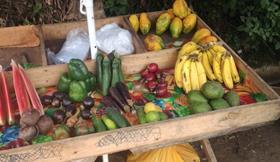
South Sudan, Africa's newest country and officially the most fragile country in the world according to the annual FSI ranking, is aiming to start sending fruit to the European Union in the near future, provided ongoing talks aimed at establishing a lasting peace following years of conflict prove successful.
Having attained independence from Sudan in 2011, the country has been beset by internal fighting and is currently not permitted to export fresh produce to the EU, but as a member of the East African Community it does qualify for duty-free entry into the EU under existing trade agreements.
“In probably a months time, South Sudanese horticultural products will be able to pass through Europe,” said an official from the country's Foreign Ministry in Nairobi who opted to remain anonymous.
“The current political situation has been a setback for exporters since last year and already the European Union imposed an economic embargo on South Sudanese products which still stands. But the good news is that peace talks are progressing including additional talks with the European Union on removing the embargo on South Sudanese products.”
The country produces relatively small volumes of tomatoes, garlic, bananas and several different types of vegetable.
While there are no accurate figures detailing the volume exported to Europe, the country had reportedly managed to establish trade links with the continent for its horticultural products until the embargo was imposed in 2014.
Arrested development
“The country has been through a series of civil wars even when it was a part of the Sudan. Most of the horticultural exports are destined to the UK,” commented Dikembe Lukong, an apple and grape producer from South Sudan, during a recent visit to Nairobi.
“Currently, we are spending more on imports than we are exporting mainly because of little investment in the agricultural sector. Sorghum is the major cash crop in the country, but we are now focusing on fruits and vegetables.”
Lukong said he wanted to set up a website to market South Sudanese fruit and vegetable.
'I plan to launch the South Sudan Horticultural Exporters Association (SSHEA) which will also have a website in the near future. The government are always updating us as exporters on the progress of the talks on a bi-weekly basis', he explained.
He added that a number of wealthy individuals, supermarkets and hospitals in western Europe had agreed to regularly purchase his produce, but the current embargo and conflict still stood in the way.
'Yes, those are obstacles, but the good news is that I have agreed with them on phytosanitary matters and other EU export regulations. In [the] coming few months, the embargo should be lifted as the political leaders wait to sign a comprehensive peace agreement.”
According to Kenya-based consultant economist Dr Harris Mule, the African Development Bank has promised to give farmers in South Sudan grants to produce apples, grapes, citrus, sorghum, maize, sugar, tomatoes, bananas and strawberries.
But that all these depends on the peace talks and when the EU will lift the current embargo.
“The country has potential but political turmoil is ruining the country. The World Bank and the African Development Bank want to pour in grants to the country's farmers to develop their horticulture,” he explained.



